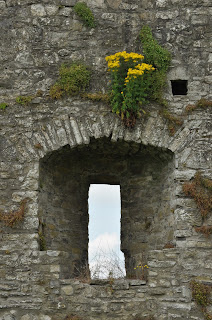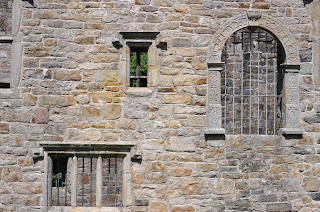Since
Robby and my birthday was coming up, I purchased tickets to Mumford and
Sons weeks before and handed them over to Robby, after making her leave
the walking tour early. The concert just happened to be that evening
and it was awesome. Well, aside from the public transit dropping us (and
everyone else) off in front of Phoenix Park and no one having any idea
of where to go, but to just follow the stream of other concert goers for
miles down the main drag. We past the zoo, the cricket field, the
botanical gardens, and still no convert venue in sight. It just happened
to be at the other end of Europe's largest park. Maybe bigger (or
similar sized) than New York's Central Park.
The
concert started at three and went to about 11pm. We started out sitting
in a grass field, relaxing in the sunshine, but as the evening wore on,
more and more people showed up and our comfy little area became
overcrowded with drunk Irish teenagers and a cesspool of trash from all
the food vendors at the event. We were entertained by the Irish
equvelant of "hicks", that wore overalls with one strap hooked, all
trying to jump on each others shoulders to see the stage, but falling
into the crowd of giggling girls. They would then go around picking up
any girl in front of them and hefting them onto their shoulders. Fun so
long as they didn't pick us up.
The
next morning we headed to Dublinia - a exhibit on the Viking history of
Dublin (more history), complete with outfits you could try on and lots
of things you could touch. My faborite part was an example of an old
fashion toilet, complete with a plastic guy sitting on it and sound
effects. I couldn't stop laughing.
Afterwards
we walked to the Kilmainham Gaol - the old Jail. Built in the 1700's
and disused in the 1930's. It housed political prisoners as well as
common criminals. The jail was unquie in that it was the first of its
kind to offer sunshine to the prisoner- someone decided that they should
try and rehabilitate the prisoners by giving them light, makes people
happier, rather than throwing them in a dark dungeon and letting their
fury turn them into meaner convicts. The prison also housed beggars-
when it was illegal to be homeless or ask for food during the Great
Potato Famine, a five-year-old boy that stole a piece of metal, a
six-year-old girl that was found on a train without a ticket and since
she was too young to have money, she couldn't pay the fine, so she ended
up in prison, and a bunch people that they exicuted for treason. The
prison has since been restored, by a few former prisoners, and used in
numerous film and tv shows as well as for daily tourist visits.
Done
with the jail and completely tried from walking about 6 miles, we ate
fish and chips, so good here, and headed off the bed. I also just want
to mention, for all my drinking friends, we passed by the Guinness
brewery, but kept walking. Huge factory, but since neither Robby nor
myself care too much about gross, hoppy beer, we decided paying $30 was a
waste of money to take a tour. I took a couple pictures of the outside
though, just to say I've been there.
The next morning we got up early and headed up the eastern coast to Bru an Boinne, an area of neolitethic tombs built around 5000-7000
years ago. That's 500 years before the pyramids and 700 years before
Stonehenge. They are large mounds with passageways dig int them that
leads to a tomb in the center. They were lived on top of, but the dead
were buried inside. Some of the little ones housed families. They look
like grassy verisons of the turtle from The Never Ending Story. Very
cool and we didn't get sneezed on.
Onwards
to Trim Castle, home of Hugh de Lacy, an Irish noble that preceeded
over Meath County, the most extensive liberty in Ireland at the time. It
was a large fortress that had a Keep - what I originally thought was a
castle, in the middle. Castles apparently are a fortified area, so a
walled area with numerous buildings inside. The tall building in the
middle with the turrets along the top is called a Keep and it houses the
King and only the people that he trusts, inside - about 20 or so
people. Everyone else sleeps outside in the courtyard or in little
tents. So much for trusting the help.
The
following morning we visited Boyle Abbey, an old abbey that was used
well into the 1700's but was eventually shut down by the English because
it didn't share the same religious beliefs. The abbots that lived there
didn't talk and prayed seven times a day. What a boring life, but at
least their home was beautiful. Tall stone walls, with large glass
windows, letting in the light and a wide inner courtyard to walk and
meditate in.
Next stop on our
never ending historical sites road trips, another castle, Parke's
Castle. It was originally owned by an Irishman, Brian, that built it and
made it his own, but he had hide a spanish general in his house for
three months and when Queen Elizabeth found out about it -see England
didn't much care for Spain in those days, she had the O'Rouke arrested
and brought before her to apologize for housing an enemy of the country.
The O'Rouke refused and was thus beheaded in 1591 and the house was
handed over to Roger Parke, a Bristish general. Parke evicted O'Rouke's
family, tore down O'Rouke's Keep, and built a new one house foor his
family with the stone.
Final
stop of the day...tombs. This time, megalithic and older than the ones
we had just seen. We visited Carrowmore, a giant cemetery with over 70
passage tombs discovered in it. A passage tomb is a shallow grave with
giant rocks places around the edges and a large stone, a Dolmen, placed
on top of the other stones. Looks like a mini archway as there is a
small entrance on one side, hence a "passage". All of the tombs align
with a massive Cairn tomb (large piles of rocks in a dome shape) in the
center of the cemetery. There are various other Dolmens and cairns on
the outskirting mountains around the county that can be seen from the
middle cairn grave and anthropologist think this was done on purpose,
all the dead face a central location - maybe because of something
spiritual. But the funny thing is that the large cairn in the center of
the cemetery was built last, about 200 years after the cemetery was
created. I don't think we will ever understand ancient societies.
There
is more, but that will just have to be on another blog as your eyes are
most likely glassed over. Thanks for reading if you made it to the end.
And your reward...more photos (I know some of you cheated and just
scrolled down until you got to the pretty pictures).
Window at Boyle Abbey
Firing wall that the Prison guards at the jail executed prisoners at.
Tomb
Parke's Castle
Robby imitating the face behind her.
Me imitating the face behind me.
Neolithic tomb.








No comments:
Post a Comment